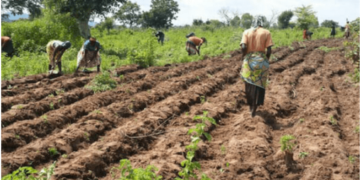The Nigerian Institute of Food Science and Technology (NIFST), Lagos State Chapter, has urged the Federal Government to initiate more friendly policies to promote sustainable agricultural practices by farmers. This call to action is seen as a crucial step towards ensuring that the agricultural sector thrives and meets the growing food demands of the nation.
Mr. Olugbenga Aina, the Lagos State Chapter Chairman of NIFST, made this appeal during the 10th Regional Food Science and Technology Summit/NIFST Day celebration held on Thursday in Lagos. The event brought together key stakeholders in the food science and technology sector to discuss pressing issues and explore innovative solutions.
The theme of the event was, “Attaining Sufficient, Safe and Healthy Food for Nigerians Through Food Science and Technology.” This theme underscores the importance of leveraging scientific advancements and technological innovations to achieve food security and improve the overall health of the population.
According to Mr. Aina, farmers play a pivotal role in producing the food that sustains the population. He emphasized that ensuring farmers have the necessary resources and support is essential for national food security. “Farmers are the backbone of our food supply chain,” he said. “Without their hard work and dedication, we would not have the food we need to feed our families and communities.”
Aina highlighted that supporting farmers could help stabilize rural economies, create jobs, and contribute to overall economic growth. He noted that many farmers live in rural areas where economic opportunities are limited. By providing support to these farmers, the government can promote rural development and improve the quality of life for rural communities.
“Presently, the government needs to address the issue of insecurity that is affecting farmers and preventing them from farming,” Aina stated. “We need food, especially now when there is inflation, insecurity, and food hunger in the land. This is one of the reasons why we are gathered here today to discuss these issues; food safety and security are two intertwined topics that are crucial to the development of any country.”
On the topic of cholera, the chairman stressed the importance of promoting good hygiene practices among communities to prevent the further transmission of the disease. He acknowledged the government’s efforts in creating awareness about the need for citizens to maintain good hygiene. However, he cautioned that consuming food bought from roadside vendors could make people susceptible to cholera. “People should be cautious about eating food from the road without knowing how it was prepared,” Aina advised. “The environment and the kind of water used to prepare food are vital factors to consider.”
Aina also pointed out that other causes of cholera include eating uncooked and contaminated foods. He advised people to always wash their hands before eating to reduce the risk of infection. “Good hygiene practices are essential in preventing the spread of cholera and other foodborne diseases,” he said.
On the topic of empowerment, Aina mentioned that NIFST, through its partnerships with businesses, industries, and government agencies, has been able to provide job opportunities for over 100 youths between last year and 2024. This initiative aims to empower young people and equip them with the skills needed to thrive in the food science and technology sector.
In his address, the National President of NIFST, Prof. Abu Oneh, emphasized the role of academic institutions and research organizations in leading scientific research, development, and innovations needed to address the current and future challenges of food security. “Our academic institutions and research organizations must continue to lead the way in scientific research and development,” he said. “We need to find innovative solutions to the challenges we face in ensuring food security for our nation.”
Prof. Oneh also highlighted the importance of private sector partners, including food producers, processors, and retailers, in bringing innovation to the market and ensuring its widespread adoption. “The private sector plays a crucial role in the food supply chain,” he noted. “Their involvement is essential in bringing new technologies and innovations to the market and ensuring that they are adopted on a large scale.”
Mrs. Taiwo Ubany, the Local Organizing Chairperson, echoed the sentiments of the other speakers, emphasizing the need for Nigeria to attain the production of safe and healthy foods. She noted that there are many technologies available that can be employed to ensure food safety and security in Nigeria. “Nigeria is a food basket,” she said. “We have the people and the soil; all we need to do is harness the resources along with technology to cater to the needs of Nigerians.”
She pointed out that food sufficiency is key, and while food is available, it is not reaching the people due to various issues. “We need to address the challenges that prevent food from getting to the people,” she said. “Ensuring food sufficiency is not just about producing enough food; it’s also about making sure that the food reaches those who need it.”
Mrs. Veronica Alaba, NIFST Adviser, called on the government to find a lasting solution to the issue of terrorism, which is hindering farmers from planting crops. “The attacks have made many farmers stop cultivating crops, leading to food inflation,” she said. “We need to address the root causes of these attacks and find ways to support our farmers so they can continue to produce the food we need.”
In conclusion, the NIFST event highlighted the critical role of farmers in ensuring food security and the need for government support to address the challenges they face. By promoting sustainable agricultural practices, supporting rural development, and leveraging scientific and technological innovations, Nigeria can achieve food sufficiency and improve the overall health and well-being of its population. The collaboration between government, academic institutions, research organizations, and the private sector is essential in achieving these goals and ensuring a sustainable and secure food supply for the nation.
























